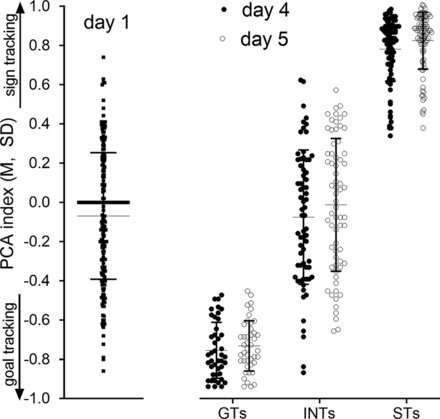Immune signals that contribute to addiction vulnerability identified in the brain


For individuals suffering from drug addiction, certain cues—whether it’s specific people, places or things—can trigger powerful cravings for repeated use.
A new University of Michigan study has identified brain signals, traditionally associated with inflammation, contributing to people’s vulnerability to addiction. With repeated drug use with the same exposure to cues, some individuals develop an inability to control their drug use, even in the face of negative consequences.
The study is published in the journal eNeuro.
In rats, researchers have demonstrated that animals with poor attentional control—choosing what is given attention to and what is ignored—develop strong cue-induced cravings. They are called sign trackers. Animals with good attentional control are considered goal trackers.
Hanna Carmon, U-M psychology graduate student and the study’s lead author, said sign trackers experience a greater rewarding effect of drug taking and will continue to take drugs even when there are painful consequences. Goal trackers stop drug taking in the face of consequences.
Carmon and colleagues focused on the relationship between the brain’s choline transporter—a protein in the cell membrane involved in attentional control—and cytokines—proteins that stimulate or slow the immune system—and the differences between sign and goal trackers.

In the study, sign trackers had more choline transporters that are dysfunctional, which contributed to their poor attentional control. They also possessed elevated cytokines.
When researchers caused cytokine levels to increase, sign trackers experienced very little change in the number of choline transporters considered dysfunctional; however, in goal trackers, they observed an expected increase in dysfunctional choline transporters, making them more like sign trackers.
“These findings indicate that there is an important interaction between increased cytokine production and decreased choline transporter function that contributes to disrupted attentional control and vulnerability to addiction,” Carmon said.
Although it is difficult to test whether human sign trackers are vulnerable to addiction, in both rats and humans, sign trackers exhibit various behaviors that demonstrate poor attentional control, including distractibility and impulsiveness. Sign trackers, therefore, represent addiction vulnerability, whereas goal trackers represent addiction resiliency.
As more research is done in this field, the study’s authors hope it will lead to better personalized treatments for those struggling with addiction.
The study’s other authors were psychology student Evan Haley and Vinay Parikh, associate professor of psychology, both of Temple University; and U-M’s Natalie Tronson, associate professor of psychology, and Martin Sarter, professor of psychology.
More information:
Hanna Carmon et al, Neuro-Immune Modulation of Cholinergic Signaling in an Addiction Vulnerability Trait, eNeuro (2023). DOI: 10.1523/ENEURO.0023-23.2023
Journal information:
eNeuro
Source: Read Full Article




